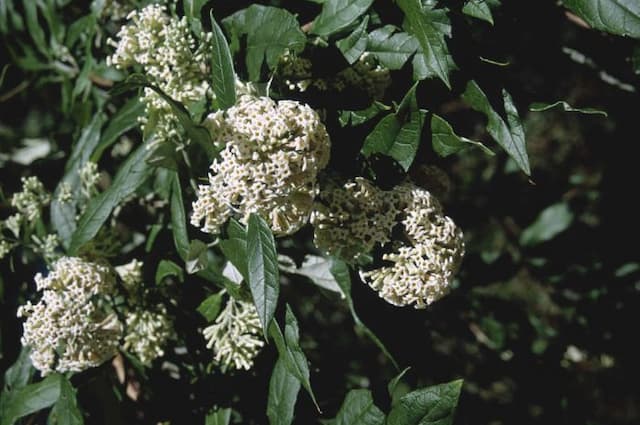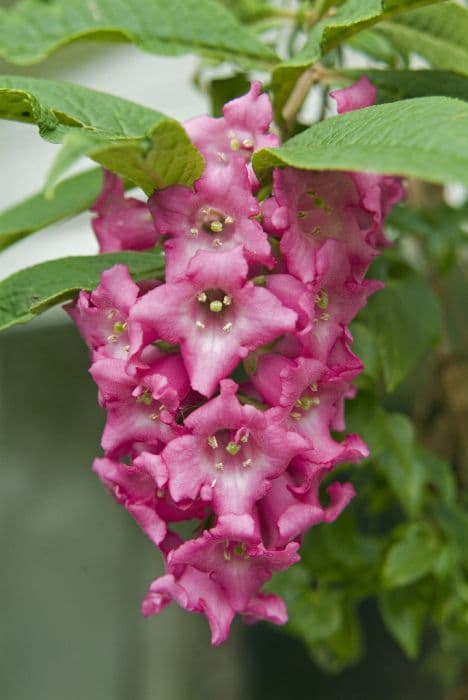Mullein 'Raspberry Ripple' Verbascum 'Raspberry Ripple'

ABOUT
'Raspberry Ripple' is a compact perennial with spikes of near-white flowers strongly flushed with purplish-pink, with a dark pink centre
About this plant
 Names
NamesFamily
Scrophulariaceae
Synonyms
Mullein, Velvet Plant
Common names
Verbascum 'Raspberry Ripple'.
 Characteristics
CharacteristicsLife cycle
Biennials
Foliage type
Semi-deciduous
Color of leaves
Green
Flower color
Mixed
Height
3 feet (91 cm)
Spread
1 foot (30 cm)
Plant type
Herb
Hardiness zones
5
Native area
Europe
Benefits
 General Benefits
General Benefits- Attracts pollinators: The blooms of the Mullein 'Raspberry Ripple' attract bees, butterflies, and other beneficial pollinators to the garden.
- Drought tolerant: Once established, it requires minimal water, making it suitable for xeriscaping or drought-prone areas.
- Low maintenance: The plant is generally pest-free and requires little upkeep, apart from occasional deadheading to prolong blooming.
- Long flowering period: It produces flowers over a long season, typically from early to late summer, adding long-lasting color to the garden.
- Architectural interest: With its tall spires of flowers and rosette of leaves, it adds height and structure to borders and beds.
- Cottage garden appeal: The plant's classic form and vibrant flowers are ideal for creating a traditional cottage garden aesthetic.
- Cut flowers: Its blooms make excellent cut flowers, adding color and interest to floral arrangements.
 Medical Properties
Medical Properties- This plant is not used for medical purposes.
 Air-purifying Qualities
Air-purifying QualitiesThis plant is not specifically known for air purifying qualities.
 Other Uses
Other Uses- Photography Prop: Verbascum 'Raspberry Ripple', with its striking colors, can be used as an eye-catching subject or background in floral photography sessions.
- Artists' Muse: The intricate details and unique coloration of the flowers can inspire artists and be used as a model for paintings and drawings.
- Dye Source: The petals could potentially be used to create natural dyes for fabrics, though it's not a common use.
- Dried Flower Arrangements: The flowers, when dried, retain much of their color and can be used in long-lasting floral displays.
- Educational Tool: Botany students can study the plant's structure and pollination strategies as part of a curriculum on plant biology.
- Garden Design: It can be used in xeriscaping, a landscaping method that reduces the need for irrigation, due to its drought-tolerant characteristics.
- Crafts: The dried seed pods and flowers can be incorporated into handicrafts like wreath making or potpourri mixes.
- Bookmarks: Pressed Verbascum 'Raspberry Ripple' flowers can be laminated or set in clear resin to create unique and beautiful bookmarks.
- Decoration at Events: With its tall spikes of bold flowers, it can be used as decoration in garden-themed events or weddings.
- Wildlife Attraction: Although not directly a use by humans, it can serve to attract bees, butterflies, and birds to a garden, enhancing local biodiversity.
Interesting Facts
 Feng Shui
Feng ShuiThe Mullein is not used in Feng Shui practice.
 Zodiac Sign Compitability
Zodiac Sign CompitabilityThe Mullein is not used in astrology practice.
 Plant Symbolism
Plant Symbolism- Healing: Verbascums, commonly known as mulleins, have been used in herbal medicine for their soothing properties, particularly for coughs and respiratory issues.
- Protection: Mulleins have been associated with warding off evil and protection due to their use in folk magic and as talismans.
- Love: The soft leaves of mulleins suggest gentleness, thus they can symbolize the tender aspects of love and affection.
- Courage: Mulleins stand tall and upright, which can represent strength and the courage to stand firm against adversity.
- Purity: The gentle colors of Verbascum 'Raspberry Ripple', particularly the lighter shades, give it a connection to themes of innocence and purity.
 Water
WaterMullein 'Raspberry Ripple', commonly known as Garden Mullein, prefers soil that is dry to medium in moisture and well-drained. Water the plant deeply once a week, allowing the soil to dry out somewhat between waterings. During hot, dry periods, additional water may be necessary, but avoid overwatering as this plant is drought-tolerant. Typically, applying about 1 gallon of water per plant each week will suffice, adjusting for rainfall, as the plant is established best in conditions that mimic its native habitat.
 Light
LightGarden Mullein thrives in full sun exposure, where it can receive at least 6 to 8 hours of direct sunlight daily. The best spot for 'Raspberry Ripple' would be an open area with unfiltered sunlight, away from large trees or buildings that could create significant shade. Adequate sun will encourage the strongest growth and best flowering performance.
 Temperature
TemperatureThe Garden Mullein 'Raspberry Ripple' can tolerate a wide range of temperatures, but it grows best between 60 to 80 degrees Fahrenheit. While it can survive minimum temperatures down to about 15 degrees Fahrenheit, extremely cold weather may damage the plant. Ideal growth occurs in a temperate environment without prolonged exposure to temperatures above 85 degrees Fahrenheit or below freezing.
 Pruning
PruningGarden Mullein benefits from occasional pruning to remove spent flower spikes and promote a second bloom. Prune 'Raspberry Ripple' immediately after the initial flowering, cutting back the flower stalks to the base of the plant. Additionally, deadheading throughout the blooming season helps encourage more flowers. The best time for major pruning is late winter to early spring, before the onset of new growth.
 Cleaning
CleaningAs needed
 Soil
SoilFor the Mullein 'Raspberry Ripple', a well-draining soil mix is crucial. A combination of equal parts loam, peat, and sand or perlite works well to ensure proper drainage. The pH should be slightly acidic to neutral, aiming for 6.0 to 7.0. Regularly amending the soil with organic matter can help maintain the ideal structure and fertility.
 Repotting
RepottingMullein 'Raspberry Ripple' generally does not need frequent repotting. It is typically repotted once every 2-3 years or when it outgrows its current container. Care should be taken to disturb the roots as little as possible during the process.
 Humidity & Misting
Humidity & MistingMullein 'Raspberry Ripple' is tolerant of a wide range of humidity levels and does well in average room humidity. It does not require high humidity and can adapt to the humidity levels typically found in outdoor environments without any special adjustments.
 Suitable locations
Suitable locationsIndoor
Provide bright, indirect light and good air circulation.
Outdoor
Plant in full sun to light shade in well-draining soil.
Hardiness zone
5-9 USDA
 Life cycle
Life cycleRaspberry Ripple mullein (Verbascum 'Raspberry Ripple') begins its life cycle as a seed, which germinates when conditions are appropriate, usually in spring or early summer. The plant starts as a rosette of leaves close to the ground, where it undergoes vegetative growth. In its second year, Raspberry Ripple mullein produces a tall flowering stalk that can reach up to 6 feet, which is adorned with pink and white flowers from early to late summer, attracting pollinators such as bees and butterflies. After blooming, the flowers are replaced by seed capsules that mature and release seeds. The plant completes its life cycle by dying after seed dispersal, as it is a biennial species. Those seeds will lie dormant until conditions are favorable for the next generation to start the cycle anew.
 Propogation
PropogationPropogation time
Spring-Early summer
The Verbascum 'Raspberry Ripple', commonly known as Mullein, can be propagated primarily through seed. Sowing seeds can be done in late winter or early spring, in trays or pots using a well-draining seed-starting mix. Scatter the seeds over the surface and lightly press them into the mix, as they need light to germinate. Keep the soil moist but not waterlogged. Germination usually occurs within 2 to 3 weeks at temperatures around 65 to 70 degrees Fahrenheit (18 to 21 degrees Celsius). Thin the seedlings once they develop true leaves, and transplant them to their final location when they are large enough to handle and the risk of frost has passed.

![Butterfly bush [Berries and Cream]](/_next/image?url=https%3A%2F%2Fplants-admin.emdemapps.com%2Fimages%2Fplants%2F%2Fimages%2F604b650f667be.png&w=640&q=75)






